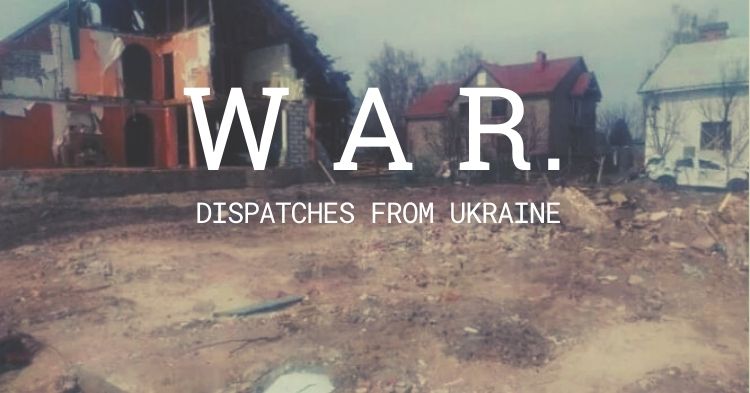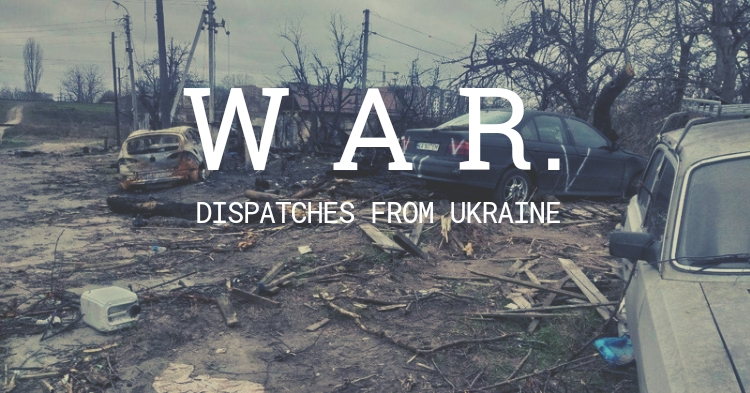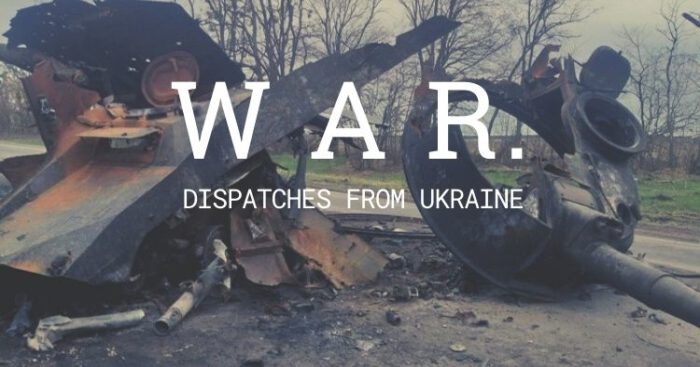My decision to go to Ovruch was pretty spontaneous. The city is located very close to the border with Belarus, through which the Russian army began its invasion of Ukraine.
It all started with a call from a good friend of mine Nina, a journalist from Finland. Her friend happened to live in Kyiv and the friend’s mother was living in Ovruch. When it all started on 24 February, I was helping her friend and her daughter with the evacuation.
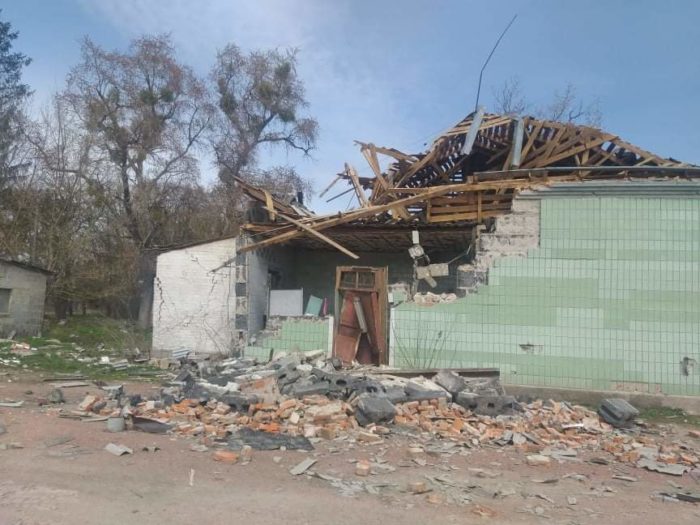
It was a one-of-a-kind adventure. Anyhow, later, after the Russians pulled back from Kyiv and northern Ukraine, Nina decided to check on her friend’s mother, while I was curious about what has happened in that part of Ukraine during the Russian invasion.
We left Kyiv very early in the morning, right after the end of the curfew, at 7 AM. The sun was rising. The road was almost perfect. Somewhere after Borodianka, we found it out that the bridge on the road to Ovruch was destroyed by bombings. Ukrainian military constructed a crossing but it was made rather for armored vehicles, than for the light ones. However, we had no choice, so we had to crawl down the road like a turtle.
After covering half of a distance on the way to Ovruch, we stopped for a short break. Just a few meters away from the road I saw a small pit, it was filled with empty boxes of the Russian soldier's field rations and bottles of Belarussian vodka. Nina smiled at me and said:
“That’s what soldiers of the “second powerful army in the world” love to do – just getting drunk.”
In Ovruch itself, we saw large quantities of Ukrainian soldiers. They were drinking coffee and chatting with each other in a lively manner. It seemed to me, that I saw more people in the center of the small town of Ovruch than I observed them in Kyiv at the time. Finally, we arrived at the house of Nina's friend’s mother Valentyna.
Valentyna gave us a typical warm Ukrainian welcome: she presented Nina with a “rushnyk,” a Ukrainian ritual woven cloth, which she embroidered herself, and generously fed us. It was very touching.
Initially, I honestly thought that Ovruch stayed far away from war. I was wrong, completely wrong. On 3 March, Russian soldiers tried to capture Ovruch right from the march but the fierce resistance of the Ukrainian military left them no chance to do that. Russians had to change their strategy on the move and surrounded the town.
However, Russians won’t be Russians, if they left it without revenge. On 6 March, the Russian army carried out a major heavy artillery strike against the city. These attacks were chaotic and probably aimed more at intimidating the local people than destroying military facilities. As a result of the strike, a lot of houses, schools, and even a kindergarten were destroyed.
And the same day in the evening, Russian aircraft coming from the airfields in Belarus, dropped bombs on the Ovruch employment agency and the abandoned area of the former military unit that was nearby. Right at the place of the damaged employment agency we have met rescue workers who were sifting through the debris. They gladly agreed to talk to us.
Nobody understood what the point of the bombing was because Ukrainian military regiments had not been stationed there for 20 years – still, there was a complete ruin in the place. One of the rescuers said that the Russians might use outdated maps, and the military unit was still somewhere on them.
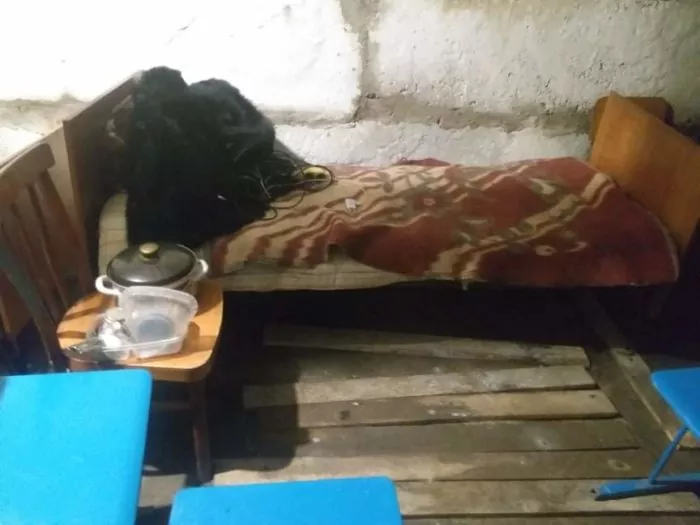
Russian actions led to a human tragedy. One of the Russian aircraft dropped a bomb on a house, which was located right next to another abandoned “military unit.” People were trying to hide in the basement of their own house but the explosion destroyed it all. The entire family died. Rescue workers had dismantled everything by now. The only thing that was left was a bathtub – people used to live there and were mercilessly killed by the Russians.
Then Valentyna offered us a walk to the Hladkovychi village where she had her another small house. It was on the outskirts of the village where the Ukrainian military stopped the advance of the Russian troops.
In the center of the village, there used to be a cultural center. However, it was half-destroyed by the Russians. Valentyna told us that a few days before our arrival, a Russian aircraft dropped one more bomb on the village, and hit a courtyard of a resident who had several greenhouses there. The man was growing vegetables for selling in markets but the Russian pilot probably thought that the greenhouses were a special threat, so he destroyed them. The situation was really absurd: combat aviation was used to destroy greenhouses.
After that, Russian aircraft destroyed a modern pig farm, which was situated a few kilometers away from the village. Moreover, they did it twice.
Approximately 1500 pigs died back then. Valentyna said that after the strike, the locals saw surviving pigs walking around the territory. Luckily, the farm was fenced around the perimeter. Many animals were wounded and trapped by concrete slabs.
We went there to see it with our own eyes. It was a terrible sight. The buildings of the pig farm were destroyed by air bombs. Instead of once a big farm now was a total ruin. And there was not a single military facility nearby. Moreover, the nearest checkpoint of the Ukrainian military was five kilometers away from the farm.
I was overwhelmed. The Russians are fighting even against innocent animals. Is it worth asking “why”? Valentyna also showed us a bomb shelter, where she hid from Russian shelling. It is located on the territory of the former orphanage. It was a reliable building indeed.
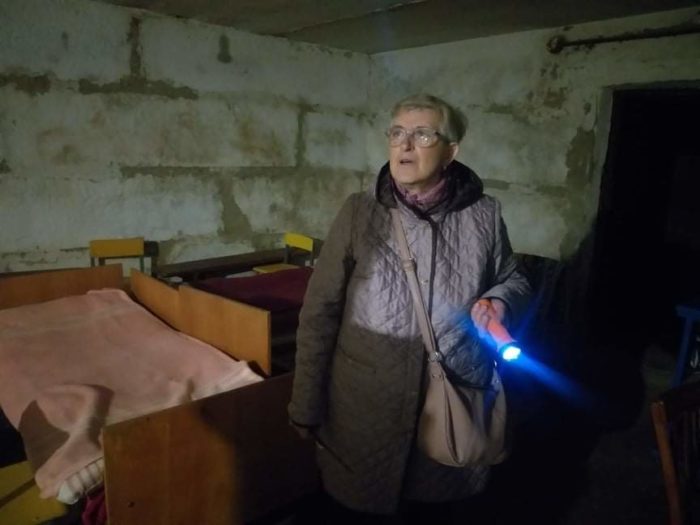
According to Valentyna, as soon as the Russians started shooting with artillery, local men came and quickly set everything up: brought beds, made a “potbelly stove,” and stood guard at the entrance. That was how they spent 40 nights.
Throughout the day, village residents stayed at home, but once it struck 6 PM, they ran to the shelter. Usually around 6:30 PM every day Russians started shelling surrounding villages and cities with artillery.
Somewhere in the middle of April, the Russians left Hladkovychi outskirts, so locals stopped hiding in the shelters. However, they still don't believe the Russians left them alone. People have no words to describe their anger and hate towards them, as well as the Belarusians, for allowing them to use the territory as a bridgehead for war in Ukraine. Now, they rely on the strength and valor of the Ukrainian army.
This is how the Russian army – the “second most powerful army of the world” – fights. No military targets. Greenhouses bombed. Small houses and pig farms bombed from the air. Civilians killed. Death, devastation, and ruins all around.
Related:
- Snyder: Ten reasons Ukraine should win the war
- Russia’s war crimes in Chernihiv Oblast: “They were beaten, tortured & executed…”
- Russian war crimes in Katiuzhanka: torture chamber, toilets in classrooms, and stolen lingerie
- “At first, I did not want to live.” Ukrainian nurse got married after Russian mine took her legs
- Fallen pilots who saved the Ukrainian Air Force
- Cruelty, murder, and destruction in Bucha




